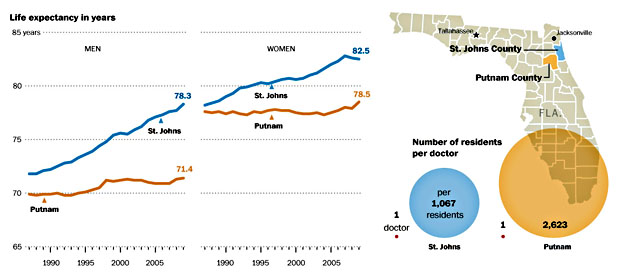Those of you who are careful readers of this blog are already aware that in recent years life expectancy has risen way more for richer people than for poorer people. The basic chart is here. Today, however, the Washington Post puts this into more concrete terms by comparing life expectancies in two Florida counties that are right next to each other. St. Johns is a well-off coastal county, while Putnam is a more working class inland county. Here’s their map:

The article makes the obvious point about how this affects the debate over whether to raise the Social Security retirement age:
The widening gap in life expectancy between these two adjacent Florida counties reflects perhaps the starkest outcome of the nation’s growing economic inequality: Even as the nation’s life expectancy has marched steadily upward, reaching 78.5 years in 2009, a growing body of research shows that those gains are going mostly to those at the upper end of the income ladder.
The tightening economic connection to longevity has profound implications for the simmering debate about trimming the nation’s entitlement programs. Citing rising life expectancy, influential voices including the Simpson-Bowles deficit reduction commission, the Business Roundtable and lawmakers on both sides of the aisle have argued that it makes sense to raise the eligibility age for Social Security and Medicare.
But raising the eligibility ages — currently 65 for Medicare and moving toward 67 for full Social Security benefits — would mean fewer benefits for lower-income workers, who typically die younger than those who make more.
“People who are shorter-lived tend to make less, which means that if you raise the retirement age, low-income populations would be subsidizing the lives of higher-income people,” said Maya Rockeymoore, president and chief executive of Global Policy Solutions, a public policy consultancy. “Whenever I hear a policymaker say people are living longer as a justification for raising the retirement age, I immediately think they don’t understand the research or, worse, they are willfully ignoring what the data say.”
Bottom line: working class and middle class workers haven’t seen much increase in their life expectancies over the past few decades. So if you raise the retirement age, you’re effectively shortening their retirements, an especially foul blow since they’re the ones with the shortest life spans to begin with.
So why do so many people keep pushing this idea? I’m going to be charitable and say that it’s a combination of ignorance and malice. Experts all understand how life expectancy works, but I imagine there are a lot of pundits and politicians who still haven’t seen the data on how it’s affected by income. At the same time, I suspect that plenty of pundits and politicians have figured it out, but just don’t care. The prospect of screwing the poor simply doesn’t bother them much.
Given the trends of the past few decades, the obvious way to address Social Security’s funding problems is to increase benefits to the relatively poor, whose benefits are low and who live shorter lives in the first place, and to reduce benefits for the well off. At the same time, increasing revenue by raising the income cap would mostly hit the upper middle class and the rich, which is precisely the population that’s (a) benefited the most from rising life spans, (b) seen their incomes increase the most, and (c) got more retirement resources at their disposal—including the option of retiring later, since many of them work at desk jobs that don’t tax their bodies. That’s the right basic approach. Raising the retirement age makes a nice sound bite, but it’s one of the worst and least fair ways imaginable of tackling Social Security’s problems.
Now that the Washington Post has run this piece on their news pages, I assume their editorial board no longer has any excuse for ignoring this. Right?












